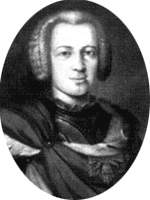Karl (Nassau-Usingen)
Karl von Nassau-Usingen (born January 1, 1712 in Usingen ; † June 21, 1775 in Biebrich ) was Prince of Nassau-Usingen from 1718 to 1775 .
biography
Karl was the son of Prince Wilhelm Heinrich von Nassau-Usingen and Charlotte Amalie, née Princess von Nassau-Dillenburg (1680–1738).
After the death of his father in 1718, his mother took over the government as regent. From 1729 to 1731 he studied at the University of Giessen . He then went to Paris and in 1731 returned to Usingen via Lorraine. In 1733 he was declared of age by the emperor and led the Principality of Nassau-Usingen until his death in 1775.
After the lines died out, Saarbrücken and Ottweiler as well as Idstein with Wiesbaden fell to Nassau-Usingen in 1728 . In 1735 the principality was divided between Karl and his younger brother Wilhelm Heinrich . Saarbrücken was divided off again, and Wilhelm Heinrich became Prince of Nassau-Saarbrücken , which, with around 22,000 inhabitants over 12 square miles, belonged to the small lords of the Old Kingdom. This naturally weakened the two new countries considerably.
On August 11, 1736 he received the Order of the White Eagle . The residence of the House of Nassau-Usingen had been the city of Usingen im Taunus since 1659 . In 1744, Prince Karl relocated the residence to Biebrich Castle , which had previously been used as a summer residence. In the Wiesbaden forest he founded the pheasantry and commissioned the construction of the hunting lodge there , which was completed in 1749. In December 1768 he was also awarded the Elephant Order .
Prince Carl benefited from his mother's "modern" laws during his reign. He too was concerned about the well-being of his subjects. He particularly promoted Wiesbaden, the seat of the government, which was housed in the old castle. A printing company was able to set up shop in Wiesbaden, he also founded a faience factory and reorganized gambling. Particularly noteworthy is its ban on drinking coffee. Not only did health considerations play a role, he also saw the danger that a lot of money would go abroad through the import of coffee beans.
After his death on June 21, 1775 in Biebrich, he was buried in Usingen. His eldest son, Karl Wilhelm, succeeded him as Prince of Nassau-Usingen.
family
On December 26, 1734, Prince Karl married Princess Christiane Wilhelmine of Saxony-Eisenach (1711–1740), a daughter of Duke Johann Wilhelm of Saxony-Eisenach . The marriage had four children:
- Karl Wilhelm (* 1735; † 1803), Prince of Nassau-Usingen
- Franziska (* 1736; † 1741)
- Friedrich August (* 1738; † 1816), Prince of Nassau-Usingen and later Duke of Nassau
- Johann Adolf (* 1740; † 1793), Prussian general
In his second morganatic marriage , Karl married Magdalene Groß (* 1714; † 1787) from Wiesbaden, the daughter of the Wiesbaden city school council. This marriage also had four children:
- Philippina Katharina von Biburg (* May 17, 1744; † July 17, 1798) ⚭ 1773 Karl Friedrich von Kruse (1737–1806)
- Karl Philipp Graf von Weilnau (born March 25, 1746 - † August 15, 1789)
- Sophie Christine (June 20, 1750 - November 16, 1750)
- Wilhelm Heinrich (February 15, 1755 - April 6, 1755)
literature
- Ernst Joachim: Karl von Nassau-Usingen . In: Allgemeine Deutsche Biographie (ADB). Volume 15, Duncker & Humblot, Leipzig 1882, p. 313.
- Continued new genealogical-historical news of the most noble events that happened at the European courts . Volume 89; Volumes 163–168, p. 618 ( digitized in the Google book search).
Web links
- Nassau-Usingen, Prince Karl of. Hessian biography. In: Landesgeschichtliches Informationssystem Hessen (LAGIS).
- Stamm-Tafel XLV Nassau
Individual evidence
- ↑ Rolf Faber: The Fasanerie on the pages of the Museum Klarenthal, accessed on January 21, 2019
- ^ History of Karl (Nassau-Usingen) (note: with incorrect information on December 31, 1712 as the date of birth)
| personal data | |
|---|---|
| SURNAME | Karl |
| ALTERNATIVE NAMES | Nassau-Usingen, Karl von |
| BRIEF DESCRIPTION | German prince from the line of Nassau-Usingen |
| DATE OF BIRTH | January 1, 1712 |
| PLACE OF BIRTH | Usingen |
| DATE OF DEATH | June 21, 1775 |
| Place of death | Biebrich |


